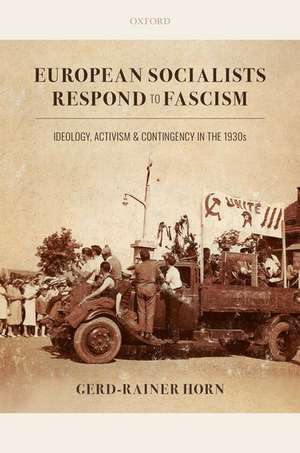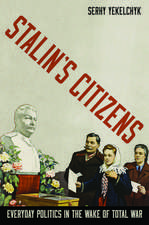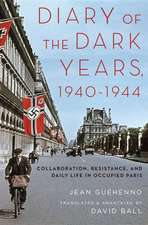European Socialists Respond to Fascism: Ideology, Activism and Contingency in the 1930s
Autor Gerd-Rainer Hornen Limba Engleză Paperback – 10 iul 2020
| Toate formatele și edițiile | Preț | Express |
|---|---|---|
| Paperback (1) | 181.97 lei 10-16 zile | |
| OUP OXFORD – 10 iul 2020 | 181.97 lei 10-16 zile | |
| Hardback (1) | 920.15 lei 31-37 zile | |
| Oxford University Press – 23 ian 1997 | 920.15 lei 31-37 zile |
Preț: 181.97 lei
Preț vechi: 223.74 lei
-19% Nou
Puncte Express: 273
Preț estimativ în valută:
34.82€ • 36.14$ • 29.11£
34.82€ • 36.14$ • 29.11£
Carte disponibilă
Livrare economică 12-18 februarie
Preluare comenzi: 021 569.72.76
Specificații
ISBN-13: 9780198863731
ISBN-10: 019886373X
Pagini: 224
Dimensiuni: 156 x 234 x 13 mm
Greutate: 0.35 kg
Editura: OUP OXFORD
Colecția OUP Oxford
Locul publicării:Oxford, United Kingdom
ISBN-10: 019886373X
Pagini: 224
Dimensiuni: 156 x 234 x 13 mm
Greutate: 0.35 kg
Editura: OUP OXFORD
Colecția OUP Oxford
Locul publicării:Oxford, United Kingdom
Notă biografică
Gerd-Rainer Horn has been Professor of History at Sciences Po, Paris, France, since 2013. He has previously taught at Western Oregon University, the University of Huddersfield, and the University of Warwick. His area of research expertise is the twentieth century history of transnational social movements in continental Western Europe. His other publications with Oxford University Press include The Spirit of Vatican II: Western European Left Catholicism in the Long Sixties, 1959-1980, Western European Liberation Theology, 1924-1959, The Spirit of '68: Rebellion in Western Europe and North America, 1956-1976, and the forthcoming The Moment of Liberation in Western Europe: Power Struggles and Rebellions, 1943-1948.
Recenzii
his book is a convincing indictment of the concessions all too often subliminally made to Comintern orthodoxy by much conventional history.
The strength of the book lies squarely on the intelligence of its comparative framework and it is, above all, for this reason that it should be required reading not only for all those who seek to understand the West European Left in the 1930s but also for all those interested in the more fruitful products of comparative history.
The strength of the book lies squarely on the intelligence of its comparative framework and it is, above all, for this reason that it should be required reading not only for all those who seek to understand the West European Left in the 1930s but also for all those interested in the more fruitful products of comparative history.
















